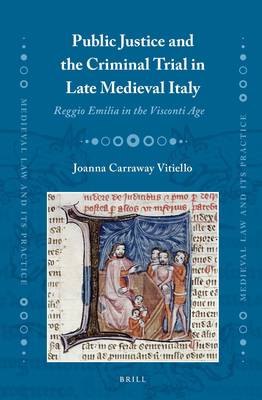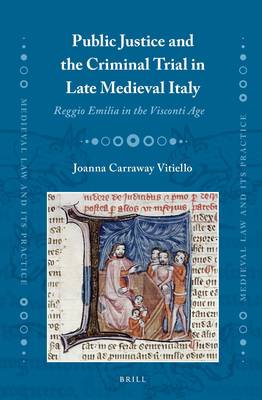
- Afhalen na 1 uur in een winkel met voorraad
- Gratis thuislevering in België vanaf € 30
- Ruim aanbod met 7 miljoen producten
- Afhalen na 1 uur in een winkel met voorraad
- Gratis thuislevering in België vanaf € 30
- Ruim aanbod met 7 miljoen producten
Zoeken
Public Justice and the Criminal Trial in Late Medieval Italy
Reggio Emilia in the Visconti Age
Joanna Carraway Vitiello
€ 216,95
+ 433 punten
Omschrijving
In Public Justice and the Criminal Trial in Late Medieval Italy: Reggio Emilia in the Visconti Age, Joanna Carraway Vitiello examines the criminal trial at the end of the fourteenth century. Inquisition procedure, in which a powerful judge largely controlled the trial process, was in regular use in the criminal court at Reggio. Yet during the period considered in this study, technical procedural developments combined with the political realities of the town to create a system of justice that prosecuted crime but also encouraged dispute resolution. Following the stages of the process, including investigation, denunciation, the weighing of evidence, and the verdict, this study investigates the court's complex role as a vehicle for both personal justice and prosecution in the public interest.
Specificaties
Betrokkenen
- Auteur(s):
- Uitgeverij:
Inhoud
- Aantal bladzijden:
- 232
- Taal:
- Engels
- Reeks:
- Reeksnummer:
- nr. 20
Eigenschappen
- Productcode (EAN):
- 9789004307452
- Verschijningsdatum:
- 11/02/2016
- Uitvoering:
- Hardcover
- Formaat:
- Genaaid
- Afmetingen:
- 152 mm x 236 mm
- Gewicht:
- 453 g

Alleen bij Standaard Boekhandel
+ 433 punten op je klantenkaart van Standaard Boekhandel
Beoordelingen
We publiceren alleen reviews die voldoen aan de voorwaarden voor reviews. Bekijk onze voorwaarden voor reviews.








